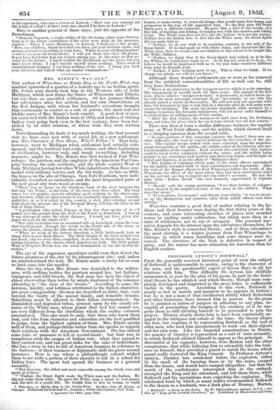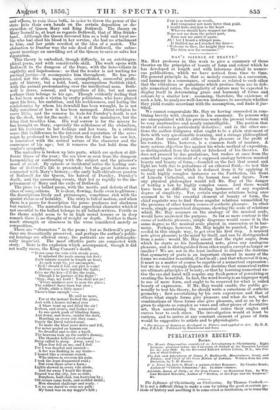PROFESSOR ATTOUN'S BOTHWELL. * FROM the generally received historical point of
view the subject of Bothwell is unfavourable to poetiy, owing to the character of the man, and the questionable aspect of Queen Mary in all her relations with him. This difficulty Dr. Aytoun has skilfully surmounted, in part by the plan of his poem, in part by the historical theory he has adopted, and which theory, though more completely developed and supported in the prose notes, is sufficiently visible in the poetry. According to this view, Bothwell is nearly as bad in morals and manners as he appears in history ; but he is not a man of that intellectual ability which Robertson and other historians have deemed him to possess. In the poem lie is painted as infirm of purpose in adhering to any plan, incapable of penetrating the designs of his enemies, or if he suspects them as still allowing himself to be persuaded to join the project. History clearly shows him to have been continually engaged in the intrigues and cabals of the time : the theory adopts the fact, but explains it by representing Bothwell as the tool of abler men, who used him unconsciously to work out their objects and his own ruin. Like the Imperial assassinations in Russia, the murder of Darnley is represented as a sort of state neeessi
in which Bothwell allowed. himself to appear as the principal.
distrustful of his capacity, however, were Morton and the other conspirators, that while inducing him to ostensibly take the-business on himself, they provided a guard to watch the house, which guard really destroyed the King Consort. In Professor Aytonn's opinion, Darnley was awakened before the explosion, either by the smell of the burning fusee or by the noise, escaped from the house, and would have.escaped altogether, but that the watch of the confederates intercepted him in the orchard, strangled the King and his attendant, and left them there, while Bothwell and his myrmidona were expecting the explosion.. The celebrated band by which so many nobles recommended Bothwell to,the Queen, as a husband, was a dark plan of Murray, Morton, + Bothwell: a Poem in Six Parts. By IT, Edmondstoune Aytoutz,-11:C.L.; Ath thor of "Lays of the Scottish Cavaliers," 4-r. Published by Blackwood and Sons, era, to ruin them both, in order to throw the power of the th their own hands on the certain deposition or deon of Queen Mary and King Bothwell. The theory on erself is, at least as regards Bothwell, that of Miss Stria
and o state struc Mary land. Although the Queen favoured him as a bold and loyal noble who had shed his blood in her service, she had no attachment to him, and her pride revolted at the idea of a match. The abduction to Dunbar was the sole deed of Bothwell, the subsequent marriage an unwilling act of the Queen to save or salve her re utation.
is theory is embodied, though diffusely, in an autobiographical poem, and, with considerable skill. The work opens with Bothwell in the dungeon of the Dane, with the hero-villain in captivity and hopelessness : so that the reader is not waiting for poetical justice—it accompanies him throughout. He has presented not the able, sagacious, accomplished, successful profligate of history, but a bold, hard, unscrupulous Scottish chief, with the animal predominating over the intellectual man. Bothwell is fierce, sensual, and regardless of life, but not more perhaps than belongs to his age. Though evidently feeling that he has been made a victim by crafty politicians, who have played upon his love, his ambition, and his recklessness, and hating the confederates by whom his downfall has been wrought, he is not fully conscious of how it has been managed. About religion he cares little, and the remorse he feels for Darnley's death is not for the deed, but for.the mode ; it is not the manslayer, but the felon that troubles him. His real sorrow is for the misery he has brought on Mary, especially the selfishness of the abduction, and his resistance to her feelings and her tears. In a critical sense this indifference to the interest and. reputation of the sovereign he professed to love loyally from the first, time he saw her, is consistent with the animal nature of the character and. the coarseness of his age ; but it removes the last hold from the reader's sympathy.
The narrative is broken up into parts, which are spoken at different times of the year ; the sea view as seen from the dungeon harmonizing or contrasting with the subject and the prisoner's mood of mind. By episode or incidental notice the leading outline of BothwelPs life is presented ; but the great features are connected with Mary's history,—the early half-chivalrous passion of Bothwell for the Queen, his hatred of Darnley, Darnley's death, and the succeeding events, that led so rapidly to the imprisonment of Mary and. the exile of Bothwell. The piece is a ballad poem, with the merits and defects of that class of compositions. It is clear, flowing, facile even to glibness ; the descriptions lively and picturesque, sometimes rich with the quaint richness of heraldry. The story is full of motion, and when there is a pause for description the pause produces not slackness but variety. The narrative has that superficial character which if not essential to the ballad belongs to all ballad-writers. Fertile as the theme might seem to be in high moral lessons or in deep remark there is no thought of weight or depth. Neither is there much strength or closeness in the verse considered merely as composition. There are " characters " in the poem ; but as Bothwell's prejudices are dramatically preserved, and perhaps the author's political leanings are allowed sway, the portraits are not philosophically impartial. The most effective parts are connected with story. • Here is the explosion which accompanied, though it did not really cause, the King Consort's death.
"Down came the rain with steady pour, It splashed the pools among our feet; Each minute seemed in length an hour, As each went by, yet uncomplete. Hell ! should it fail, our plot is vain ! Bolton—you have mislaid the light ; Give me the key—I'll fire the train, Though I be partner of his flight ! ' Stay, stay, my Lord ! You shall not go ! 'Twere madness now to near the place ; The soldiers' fuses burn but slow ; Abide, abide a little space ! There's time enough '-
He said no more, For at the instant flashed the glare, And with a hoarse infernal roar A blaze went up and filled the air ! Rafters, and stones, and bodies rose In one quick gush of blinding flame, And down, and down, amidst the dark, Hurtling on every side they came. Surely the Devil tarried near, To make the blast more fierce and fell, For never pealed on human ear .• So dreadful and so dire a knell. The heavens took up the earth's dismay, The thunder bellowed overhead ; Steep called to steep. Away away !— Then fear felon me, and I fled. . For I was dazzled and amazed— A fire was flashing in my brain— I basted like a creature crazed, Who strives to overrun his pain. I took the least-frequented road; But even there arose a hum ; Lights showed in every vile abode, And far away I heard the drum. Roused was the city, late so still; Burghers, half-clad, ran hurrying_,Aby • Old crones came forth, and scolded shrill ; Men shouted challenge and reply. • Yet no one dared to cross my path : Mthand was on-my dagger's hilt';
Fear is as terrible as wrath, And vengeance not more fierce than guilt. I would have stricken to the heart Whoever should have stopped me then.
None saw me from the palace part, None saw me enter it again. Ah ! but I heard a whisper pass, It thrilled me as I reached the door ' Welcome to thee, the knight that was,
The felon now for evermore!'"

























 Previous page
Previous page